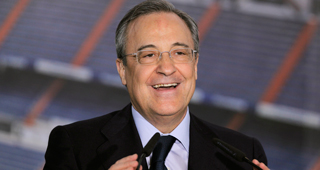On its face, this seems a wildly churlish thing to say about the three times consecutive European champions, but these last few years of Real Madrid teams have not been all that good. They have been timely, finding whatever gear—whatever luck—they have needed in continental competition while merely getting by the rest of the time. Zinedine Zidane’s genius was ego management and a certain commanding air, stalking the sidelines like a handsome eagle, one of the only men who could coax respect out of Cristiano Ronaldo. When his Real Madrid cooked, it was because Marcelo danced into the box, Ronaldo scored every half-chance, and Luka Modric and Toni Kroos merged into one mind, solving in real time problems Zidane couldn’t crack at a whiteboard. He kept the squad happy and focused, and they did the big work.
This isn’t a bad way to manage, when you’ve got the nigh unparalleled talent Madrid have accrued, and three successive Champions Leagues renders you more or less beyond criticism, but if you watched those Madrid teams domestically, they weren’t sterling against Real Sociedad and Alaves. They simply found ways to win, parlaying 15 or even five minutes of fine play into win after win. The level they assumed in big games wasn’t a regular thing. As often as not, they looked ordinary, a few bad bounces away from an enervating streak of losses and draws.
So it makes sense that with Ronaldo and Zidane gone, with Marcelo entering the half-washed Alvesian sunset stage of his career, Isco about three more weeks of benchings away from wandering the sidewalks with milk coagulating in his beard, one manager out the door already and the current one a dead man walking, soundly knocked out of the Copa del Rey by Barcelona midweek, then punted a quarter-mile from the league title race by that same eternal rival over the weekend, Real Madrid are finally in the midst of some harsh self-assessment. Well, if the folks who run the club aren’t, the local papers—pretty firmly in Florentino Perez’s pocket most of the time—certainly are. And anyway, Perez is a smart man. He knows what’s up, that he let this half-busted thing ride for a year too long and there are going to need to be drastic renovations over the summer.
This isn’t hindsight: you could see that the changes should have come sooner. The attack had been built around Ronaldo, with Karim Benzema not a goal-getting nine so much as a table-setter for the Portuguese. Without his usual partner on the left wing, Benzema’s immense positional intuitiveness is wasted. Gareth Bale doesn’t fly into the spaces Benz leaves like Ronaldo did; Marco Asensio and Vinicius can’t yet quite trace geometry that advanced. You end up wishing the Frenchman would score more, but that’s not his game, and you wish Madrid were more inventive in the final third—seemingly every foray toward the box ends in a long shot or a cross—but they haven’t had to be in a long time.
There was an earned arrogance about Zidane’s sides, a sense that they would figure things out when they needed to. Under the since-sacked Julen Lopetegui, and the soon-not-invited-back Santi Solari, answers have been less forthcoming. In Ronaldo’s absence, no clear ideas have taken root, and that is what’s needed, when you lose the second-best player of his generation. Without invention or a world-historic goal threat, Madrid matches are dominated by hesitance, teammates crossed up or slightly annoyed with one another. Are you gonna—wait—okay, so what’re we… and another 23-yard effort wails plaintively over the crossbar.
Of course, the season isn’t completely over. The Champions League is still there for Real Madrid. Los Blancos were outplayed in the first leg against Ajax but came out on top anyway. They should take care of business at home, and from there, who knows how they’ll proceed through the tournament. Maybe they’ll draw Atlético Madrid and knock them around like they did a few weeks ago. Maybe they’ll draw the winner of Porto-Roma. There really is no accounting for the number of horseshoes they can extract from their collective bottoms when the stakes are highest. But that isn’t something you would bet on. Though Real Madrid might not adhere to logic, all you can go by in assessing them is your lying eyes, which tell you they’re not up for competing against Europe’s very best.
For once, it seems Real Madrid might die a reasonable death and finish a just-okay season with just-okay results. If that’s the case, or even if it isn’t, upheaval is inevitable. They’ll see if they can shake Mauricio Pochettino free from Tottenham, Eden Hazard from Chelsea. They’ll be linked with every established striker on the continent. Gareth Bale, having proven he lacks the consistency to fill Ronaldo’s boots, will be offloaded and replaced. A top-notch midfielder or left back might arrive.
This is familiar stuff, prototypically Real Madrid Behavior, except that the club hasn’t operated that way for a while. They’ve mostly made smart, quasi-bargain-like signings, invested in youth, and paid more attention to fit than starpower. For a while, that has worked well, if not perfectly. But the advantage of being the biggest club in the world is that when all else fails, you can afford to be spectacularly unsubtle, remake the shape of an entire squad in the span of a single summer. Aging, out-of-whack, and without inspiration, that’s what Real Madrid require. They’ve always had the capacity to do it; now they finally have the impetus as well.



